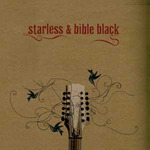|
|
 |
Dusted Reviews
Artist: Starless & Bible Black Album: Starless & Bible Black Label: Locust Review date: Sep. 10, 2006 |

|
|
|
 |
With Starless & Bible Black, an unassuming Manchester band named after a Dylan Thomas play and fronted by Frenchwoman Helene Gautier, Locust continues its tradition of popularizing strangely engaging, modernist folk music. In the tradition of Born Heller (though sounding nothing like them), Starless engage the tropes of antique folk and folk revival through a rigorously formal songwriting approach, filtering tradition through the music of more recent decades to yield a new and clean permutation of the everyday.
While the angularity of Starless’s songs concords with the Fairport Convention, Gautier’s mixture of French and English lyrics, and her rugged, decidedly un-chanteuse manner of delivering them, suggests origins in pastoral Quebec. Few things beyond the face of the Queen on Canadian money animate its shared history with England, but Starless & Bible Black, by particularly resembling both British folk and Canadian guitar-playing (Joni, Neil Young), draws a template that attests to those countries’ shared history (and inadvertently excludes that upstart, USA).
Thus while “freak-folk” typifies America in all her goofy, communalist, postmodern Californi-ality, Starless & Bible Black blow in with the green, reserved air of the heath and the Arctic Circle, serious and hard. The band does profess a love of prog and the Moog, but this is borne out only in incidental moments of Steely Danishness (not a gibe!). Gautier broadens Starless’s sound by singing as an instrument, both her French and English lyrics falling into the background. This is a blessing, stylistically, and elides some writing weakness. The diverse instrumentation similarly serves the songs without overpowering them.
Where the opener, “Everyday and Everynight” is a rollicker, featuring male-female harmony, most of the other tracks are subdued. On “Sirene,” Gautier seems to sing vulnerably below her range; her accent especially European here, she shifts from English to French before one can catch quite what she says. “Hermione” also employs such code switching, so that the listener invents English words to go with the French syllables. The song’s tautness makes it memorable. Each song has internal wholeness, reminiscent of Cezanne; the elements of each are built up in relation to each other, so that they shimmer, tightly circumscribed, intact.
By Josie Clowney
|







